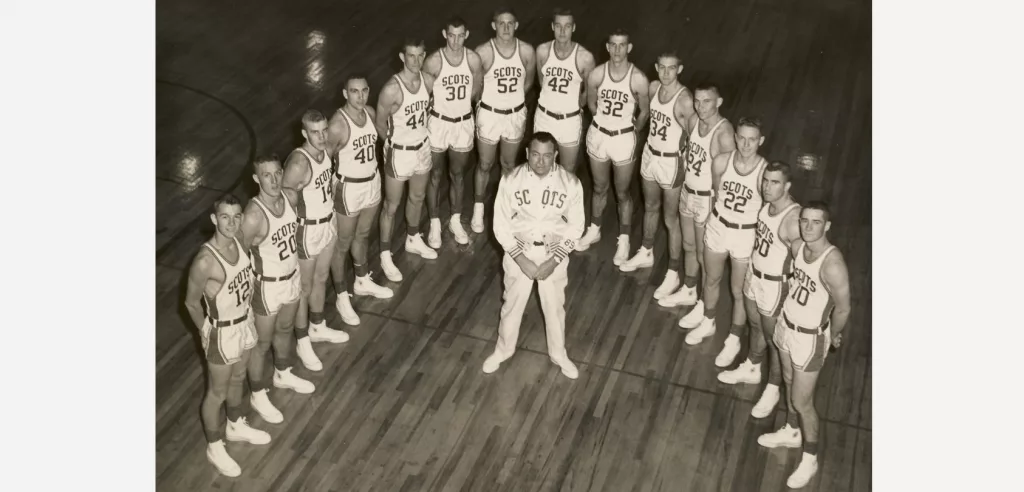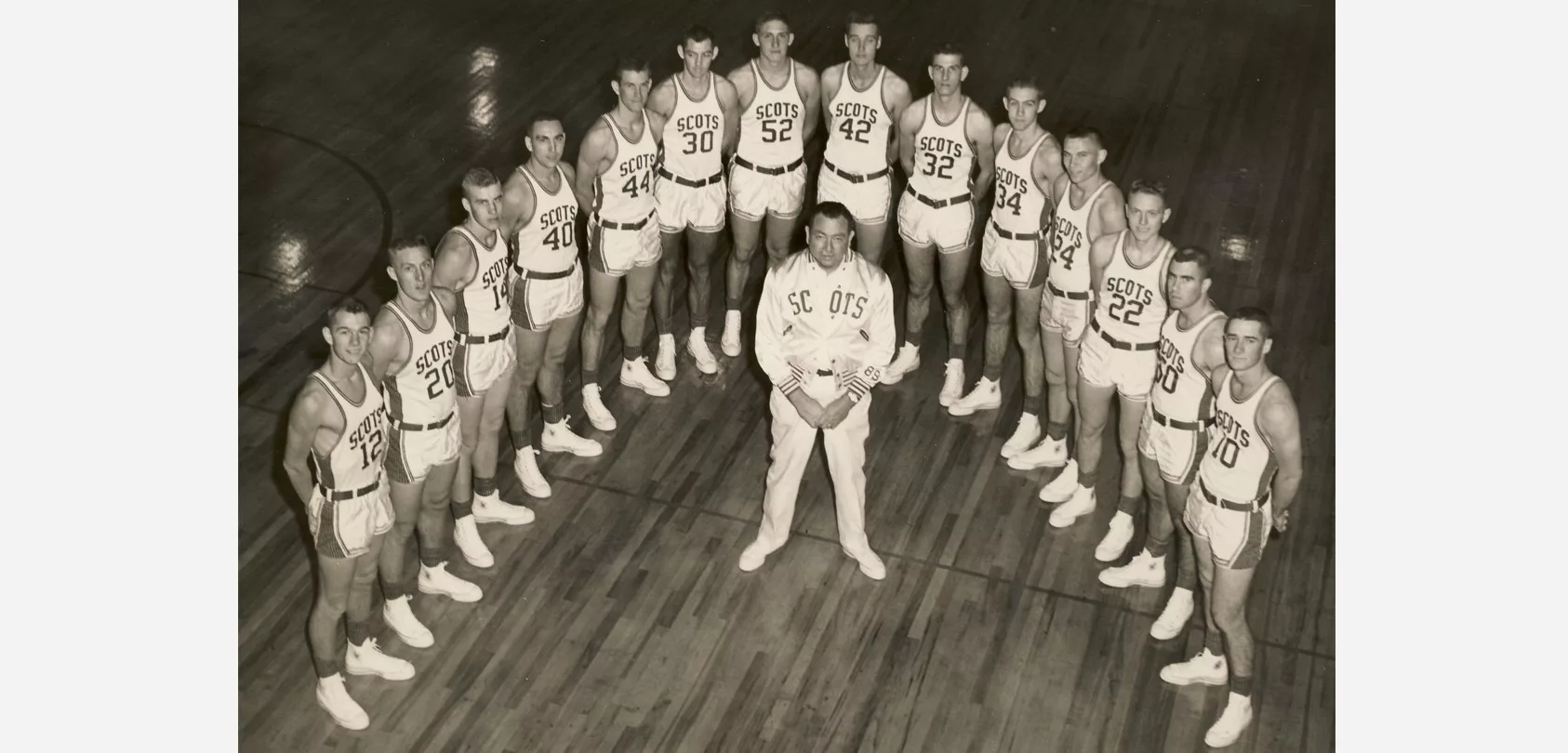
Above: The Arkansas College Basketball 1960-61 team and Coach R.C. “Dick” Winningham – Lyon College Athletics
Former Arkansas College (now Lyon College) basketball players from the Coach R.C. “Dick” Winningham era will reunite on Nov. 16 at Lyon College in Batesville, where they will be honored at halftime during the men’s basketball game against Austin College. Known for their resilience and teamwork, these players return to celebrate a legacy that defined Arkansas College athletics for nearly two decades.
Throughout the 1950s and 1960s, Arkansas College varsity athletics meant basketball, and basketball meant Coach Winningham. He was the college’s first professional basketball coach and a central figure in its history. A native of Formosa, Arkansas, and a graduate of Arkansas State Teachers College (now the University of Central Arkansas), Winningham came to Arkansas College in 1951 as director of athletics. With the school discontinuing its football program, he devoted his efforts to basketball, a position he held for 20 years.
Winningham’s disciplined approach, humor, and dedication to his players left a lasting mark on those who played under him. He was known for turning small-town players into fierce competitors, often building his strategy around standout shooters while relying on hardworking role players to outlast larger, stronger teams. His innovative, fast-paced offense was rare in the early 1950s and became a hallmark of his teams, leading the Scots to a series of successful seasons, including back-to-back AAU tournament victories in 1952 and 1953. His 1953 team, led by all-conference stars Harry Neff and Bobby Smith, nearly reached the NAIA national tournament before narrowly falling to Arkansas Tech in the district finals.
Winningham’s teams consistently brought pride to the college, placing players on the All-Arkansas Intercollegiate Conference (AIC) teams, despite limited scholarship resources. In the 1959-60 season, a boost in funding allowed him to field one of his best squads, including first-team all-conference player Francis “Birdie” Rogers from Mammoth Spring. That team defeated Arkansas Tech in a thrilling last-minute victory and advanced to the NAIA district tournament championship, narrowly missing the title after a close loss to Arkansas A&M (now the University of Arkansas at Monticello).
“I grew up in Batesville across the street from the Arkansas College gymnasium and spent many years watching Coach Winningham’s teams play,” said Lyon College trustee James L. “Skip” Rutherford. “On several occasions particularly against AIC rivals such as Arkansas Tech, Arkansas State Teachers College, Henderson, Ouachita, and Southern State (now Southern Arkansas University), I would get to the gym very early just to get a seat. It was fun growing up in Batesville and experiencing the college and community spirit he generated.”
Despite these highs, Winningham’s career was not without challenges. In 1960, a disciplinary suspension of four players led to a turbulent season, a campus protest, and an infamous student demonstration involving an effigy on the president’s lawn. However, his leadership remained steadfast, and he continued fielding competitive teams known for their grit. That year, with limited student housing, Winningham converted part of the gym into dorm rooms, where players lived in exchange for helping maintain the facility.
Winningham’s teams, primarily composed of players from northern Arkansas’s small towns, earned a reputation for resilience and sportsmanship, winning five consecutive sportsmanship trophies in the AIC. Standout players from this era include the late Lavaughn Robertson and Jim Haney.
Robertson, a talented shooter from Rector, scored over 2,100 points in his career, becoming the first Arkansas College athlete to make the all-conference first team three times. Haney, a skilled guard from Salem, matched Robertson’s accomplishment with his third consecutive all-conference selection in 1968, during a season that saw the Scots achieve a 23-10 record and an AIC tournament championship. Over half of the student body traveled to Pine Bluff to support the Scots in the championship.
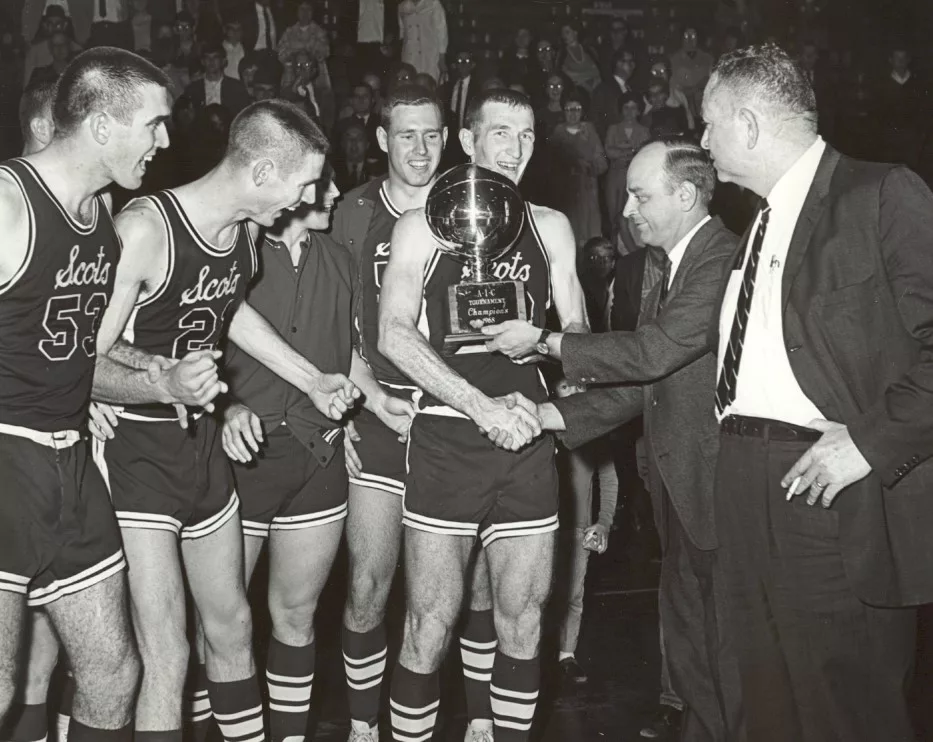 1967-68 AIC sportsmanship trophy
1967-68 AIC sportsmanship trophy
“One of the best decisions I ever made was to come to Arkansas College and play for Coach Winningham, the most demanding and honest person I’ve ever met. He was a father figure to a lot of his players,” recalled Haney. “Lifelong brothers and friends were made during my time there. Coach Winningham made good players and great men out of his recruits. He loved us like we were his own kids. I can’t wait to see so many of my friends and teammates on Nov. 16.”
Coach Winningham’s influence extended far beyond the court. His players were held to high academic standards, with most earning degrees and several achieving significant academic honors. Ronnie Brogdon, for instance, became the first varsity athlete to receive the prestigious Coffin Medal, the highest award for student academic achievement, in 1970.
“My teammates and I were fortunate to play for Coach Winningham. His emphasis on excellence on the court and in the classroom was felt by all of us,” Brogdon said. “Many of us coached after graduation, and we all used knowledge we had gained from Coach in our own careers. We have been truly blessed by our time spent with Coach Winningham and Arkansas College/Lyon College. It has most certainly impacted our lives for the better.”
By the end of his two-decade coaching career, Winningham’s legacy at Arkansas College was deeply felt, not just in wins and losses, but in the ethical, academic, and community-focused culture he fostered. His emphasis on class attendance and academic responsibility shaped generations of student-athletes, embedding a tradition that extended into the college’s broader mission.
Winningham passed away on October 18, 1986, at the age of 69, leaving behind a profound legacy that shaped the lives of countless student-athletes. He was laid to rest at Union Hill Cemetery in his hometown of Formosa.
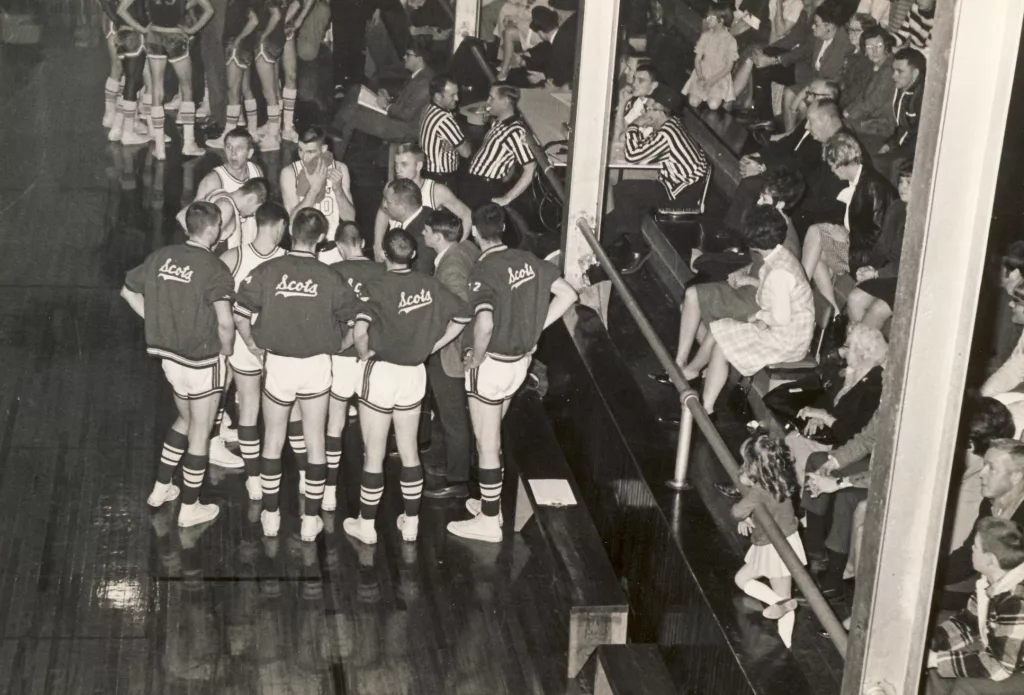 Arkansas College Basketball 1968-69
Arkansas College Basketball 1968-69
Lyon College Athletic Director Kevin Jenkins, a 1986 alumnus, expressed excitement about welcoming back players from the Winningham era.
“We are looking forward to a great time of renewing old friendships, a lot of laughter and reminiscing about their time spent at Lyon College (Arkansas College). The players and coaches during the Winningham era helped pave the wave for Lyon College to provide a first-class experience, both academically and athletically, that has a long-lasting, positive impact on the lives of our current students. We are looking forward to celebrating each of them.”
Executive Director of Alumni Engagement Cindy Barber said, “It’s such a treat to host a reunion of these wonderful Scots. We hope everyone will come out to the games that day and give them a huge ovation as they are introduced.”
Scots fans attending the Nov. 16 game are encouraged to wear Lyon College colors to honor the legacy of Coach Winningham and his teams.
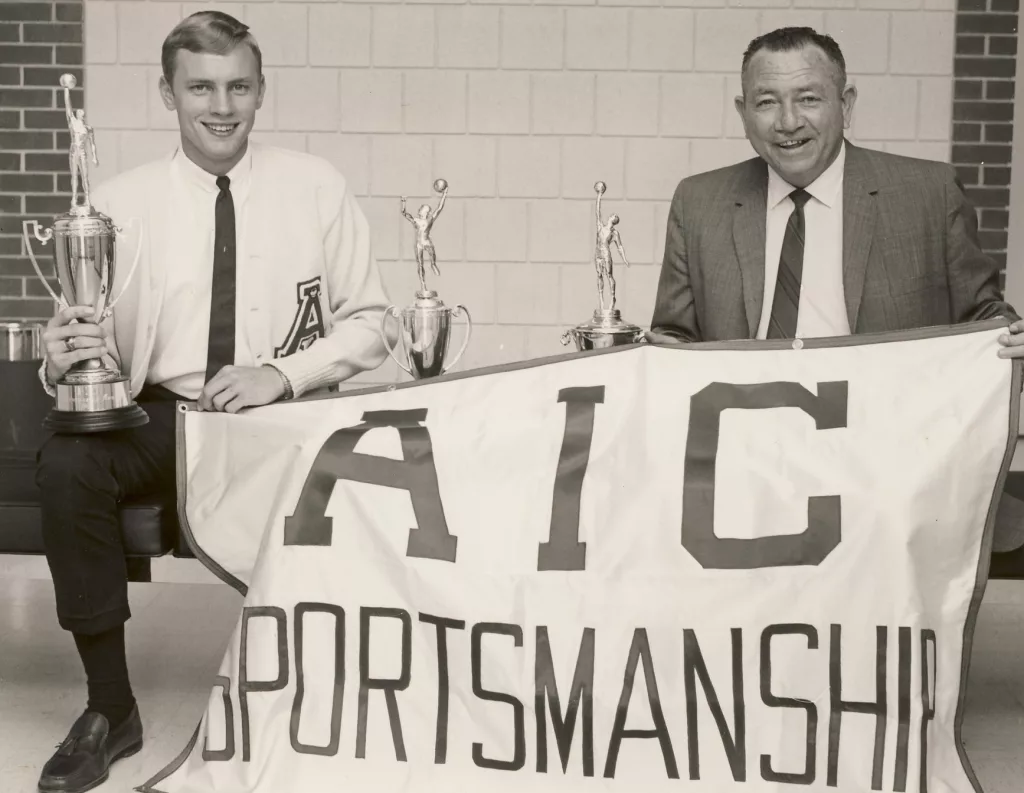 Arkansas College Basketball AIC Sportsmanship 1967-68 / Images provided by Lyon College
Arkansas College Basketball AIC Sportsmanship 1967-68 / Images provided by Lyon College
Have a news tip or event to promote? Email White River Now at news@whiterivernow.com. Be sure to like and follow us on Facebook and Twitter. And don’t forget to download the White River Now mobile app from the Google Play Store or the Apple App Store.
Get up-to-date local and regional news/weather from the First Community Bank Newsroom on Arkansas 103.3 KWOZ every weekday morning and afternoon. White River Now updates are also aired weekday mornings on 93 KZLE, Outlaw 106.5, and Your FM 99.5.








